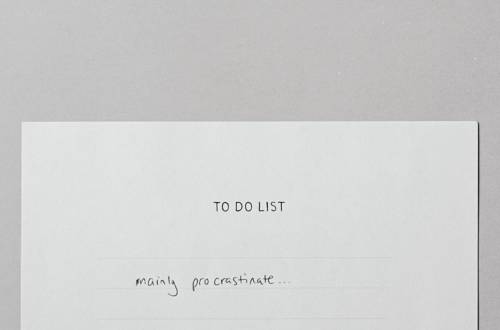
Self-Improvement Vs. Self-Acceptance: Where Should We Draw The Line?
Another new year is upon us. It’s that wonderful time when we all resolve to do better, be better, change our ways, achieve more. New year, new me! Self-improvement is all the rage. I don’t know about you, but my social media feeds were flooded with posts to this effect. Friends and family shared their intentions for the upcoming year or perfectly staged snapshots of the beautifully handwritten lists of things they hope to achieve. “Make goals, not resolutions!” they say (although I would argue the difference between goals and resolutions is predominantly semantic, but I digress). “Sharing this to keep me accountable!”
The Quest for Self-Improvement
If you’re anything like me, you looked forward to the new year, too. Each new calendar signifies a fresh start, an opportunity for change, the time when you’ll finally get your life together. You dove, head first, into plotting all the ways 2020 would be different. I really thought I had it this time around, too.
Let me explain. This past Christmas, Hubby gave me Atomic Habits by James Clear as my “something to read” gift. This book has been on both the New York Times and Amazon bestsellers lists for quite some time. So, it has been pretty high up on my to-read list as well. I was actually so excited to receive it, I started reading it the minute I had it fully out of the wrapping paper!
Clear makes a lot of excellent, very useful points about how to establish new habits that actually stick. So, like the enthusiastic student that I am (learning, woohoo!), I dug out a pen and notebook and started writing down the things I wanted to become in the new year. I want to become an organized person, a morning person, a healthy person. My mind screamed, “YES!”
The Best-Laid Plans…
Nope.
Here we are in the middle of January. It’s a new year, but not such a new me:
- My clean clothes are still living in a hamper in my closet. (I meant to hang them up or fold and store them in my dresser drawers.)
- I indiscriminately grab clothes to throw on in the morning, if I manage to change out of pajamas at all. (Really, I meant to select an outfit the night before.)
- I struggle to wake up in the morning, and my schedule is erratic. (Really, really, I meant to stick with a consistent morning routine that gets me up and ready before Little Man awakens).
- I have cooked exactly one dinner for my family. Most nights either we cobble together a hodgepodge of miscellaneous food from the fridge or Hubby and I don’t eat dinner at all. (I really, really, really meant to cook a healthy, well-balanced albeit simple meal every night).
- And, I have only nodded in the general direction of our rowing machine. (I really, really, really, really meant to exercise regularly). Oops.
But, you know what? That’s OK. Really, it is.
Choosing Self-Acceptance Instead
It has taken me a long time to come to this realization. In the past, I would have considered myself a failure for being so far off track. Now I’m rethinking that stance. Our society is obsessed with self-improvement. That’s why the marketplace is inundated with information on how to reach our full potential, to be more productive, to truly have it all. But change is difficult, especially when the behaviors you want to change are pretty well ingrained into your existing routine.
I’m not giving up on my resolutions goals for this year; there is still plenty of time left in 2020 to achieve them. I also can’t help but wonder, though, if continuing to focus on self-improvement is truly the best way forward. Trying to better yourself is, unquestionably, a noble aspiration. But, how well does such an aspiration serve the majority of us on an everyday basis? Is all this focus on change really worth it?
If you are prone to be self-critical, like I am, my guess would be: no, not really. Sometimes, going the route of self-acceptance is a much better choice. Here’s a silly example to illustrate my point:
Acceptance: The Wind Up
Hubby and I recently had a mild disagreement about how we should handle our mail. You see, mail tends to pile up in our house. There was quite the precarious stack of bills, catalogs, and junk advertisements building on top of our microwave. We have a countertop microwave (inherited from the previous owners, but that’s a whole other story), and at the time it was situated on a small section of counter that’s separate from the main work space. Every time one of us needed to use the microwave, we battled against that haphazard stack of papers. And, if we ever tried to clear off the microwave or moved those papers to a different part of the counter, they would inevitably end up right back where they started.
One day, after the umpteenth time of wrangling Pottery Barn catalogs and fliers for local pizza joints just to nuke some veggies for Little Man, I told Hubby I wanted to buy a magazine box to house all our mail. We could get it off the top of the microwave and also reduce the visual clutter in our kitchen. (Two birds, one stone, right?). Of course, Hubby immediately disagreed. “Well, if we just dealt with the mail right away…” he said.
Acceptance: The Pitch
I pointed out to Hubby that this was not the first time we had had this conversation. Perhaps we should just accept the fact that we are probably never going to be the type of people who deal with the mail right away, because:
- We have a cluster mailbox in our neighborhood, and it’s not exactly close to our house. So, we often end up collecting several days or a week’s worth of mail at once.
- We also have a toddler, which means we rarely have more than a minute or two when we walk in the door before Little Man wants to be picked up, needs to eat, is yelling at the top of his lungs, is chasing the cat, tries to poke us in the eye, or steals the envelopes right out of our hands and shoves them under the couch.
- And, finally, the real kicker. In our previous residence, the desk in our office was not more than 10 ft. away from our front door. Did we deal with the mail right away then? Nope! The mail still piled up on the kitchen counter instead. Now the office is upstairs, and I’m definitely not trudging up there to deal with the mail.
So, as much as I would love for us to change for the better and miraculously become people who sort and properly file away our mail promptly upon arriving home, I know better.
Never. Gonna. Happen.
Acceptance: The Hit
Needless to say, Hubby saw the light and caved. Now we shove all our mail into a delightful gray denim magazine box next to the microwave until we have enough free time to sort through it (read: when Little Man is sleeping). We can heat food without fighting off an avalanche of papers, and our kitchen looks a lot less cluttered. In this situation, simple acceptance of our less-than-ideal approach to handling the mail was absolutely, unquestionably the right way to go.
The Takeaway
That example may have been silly, but I think it illustrates an important point. The ultimate purpose of any self-improvement is really to make our lives better. But, sometimes, it fails to achieve the desired effect. In fact, I would even go so far as to argue that self-improvement attempts can actually make our lives worse. That’s right, worse. How?
Well, self-improvement is all about things with think we should be doing. I should really put away my laundry, wake up earlier, and eat better. But should is a very dangerous word (I have a whole post planned about this topic). It can start us on a downward spiral of thinking we’re not good enough. It can draw attention to all of the ways we think we’re failing. We start on a never-ending cycle of constantly trying to improve a little bit more, and then a little bit more after that. And, for what? A lot of the time, the changes in behavior we aim to make offer an incremental improvement in our quality of life, at best. At worst, we sacrifice our sanity chasing after unobtainable ideals.
I don’t know about you, but that’s a trade-off I’m unwilling to make. I would much rather choose self-acceptance and simply do the best I can with what I’ve got. That way, I still have time for the things in my life that matter the most.
So, where do you think we should draw the line between self-improvement and self-acceptance? I’d love to hear your thoughts!







3 Comments
Emily Borsa
What a battle it is between self-improvement and self-acceptance. We are programmed to always do better, get higher, get fixed and improve improve improve. Not that it is necessarily a bad thing to improve yourself. It is bad to only want to improve yourself due to societal standards. Make more money to have more things or lose weight to be skinny like society portrays women. Making more money isn’t bad, but at some point people have to accept that the field they chose and the path they are on, might not make them rich. We have to accept what things we have and be grateful to have them. Don’t get me started on society and how women look. It is gross what marketing does to women. But even small things, like become a morning person (also something I am striving to do) or being more organized can sometimes be asking too much. What are we capable of? How do we enjoy life? Maybe being a morning person would just make you more crabby because you don’t get to sleep in. Maybe you body just functions that way. Who knows?! It’s important to take a look at yourself and realize the things that you are blessed with already and recognize the things you can actually change. Though I say all of this, I still expect myself to try to be a morning person, eat healthier and be more organized. I think I am capable of those things, it is just a rough road to get there. But I am not putting a time limit on my goals, that would be too much pressure.
Lori
I am actually planning to talk about being a night owl in an early bird’s world in an upcoming post! I certainly don’t have all the answers, but I do think many of us have tendency to be much too hard on ourselves for not succeeding at making changes to better fit ourselves into some sort of mold of who with think we should be.
K E Garland
I think there is no line, really. It seems you have to first have self acceptance, then comes a resolution, which could either lead to self improvement, or just a solution…like the mail example. You improved your situation, but it couldn’t have happened if you didn’t accept a few facts about yourselves.
Self improvement also requires self acceptance AND a deeper reflection. For example, understanding why you have set up the conditions where opening mail is unimportant? or something like that.